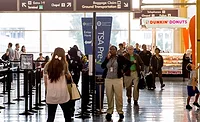Legislation Introduced to Reform TSA

The leaders of the Senate Commerce Committee have introduced a bipartisan bill to modernize the TSA.
The bill is cosponsored by Commerce Committee Chairman John Thune (R-S.D.) and Ranking Member Bill Nelson (D-Fla.), Aviation Subcommittee Chairman Roy Blunt (R-Mo.) and Ranking Member Maria Cantwell (D-Wash.).
The bill (S. 1872, the TSA Modernization Act) includes additional funding for the TSA law enforcement officer (LEO) reimbursement program to increase the number of grants that the agency can award to airports and the size of those grants. The legislation also continues funding for TSA to staff exit lanes instead of shifting that responsibility to airports as proposed by the Trump Administration and includes a new pilot program to encourage the deployment of exit line technology at smaller airports.
“This legislation responds to the challenges of aviation security, now and over the horizon, by creating more stability in the agency’s leadership and putting security assets in place that protect travelers and minimize delays,” said Thune. “TSA must learn from disappointing security testing results, terrorist attacks abroad, and traveler frustration to rise to the occasion, embrace necessary changes, and meet its critically important mission of keeping travelers safe and secure.”
Highlights of the TSA Modernization Act:
- Five-year administrator term – Establishes a five-year term for the TSA Administrator to help maintain leadership stability at TSA and bridge administration transitions (similar to the current FAA administrator).
- Addressing shortages in trained K-9s– Requires TSA to develop certification standards that allow for use of third party explosive detection dogs by TSA and aviation stakeholders to increase assistance in the screening of passengers, property, and air cargo.
- Expanding PreCheck – Requires TSA to establish at least four private sector partnerships to promote and make it easier for passengers to enroll in the TSA PreCheck program so more travelers are vetted in advance and receive expedited screening. Directs TSA to meet the following targets for expanding PreCheck enrollment from its current five million enrollees: FY 2018 – seven million, FY 2019 – 10 million, FY 2020 – 15 million.
- Wait times in real-time – Requires TSA to make information on wait times at each airport security checkpoint available to the public online and in airport terminals to inform and improve the travel experience for aviation passengers.
- Deploying new security technology– Instructs TSA to authorize third party testing and evaluation of security screening equipment and to harmonize and recognize international testing and evaluation in order to enable faster deployment of the latest and most effective screening technologies.
https://www.thune.senate.gov/public/index.cfm/press-releases?ID=94B0B6A7-F6B3-4DFA-B4E0-1801F7FC6D65
Looking for a reprint of this article?
From high-res PDFs to custom plaques, order your copy today!







